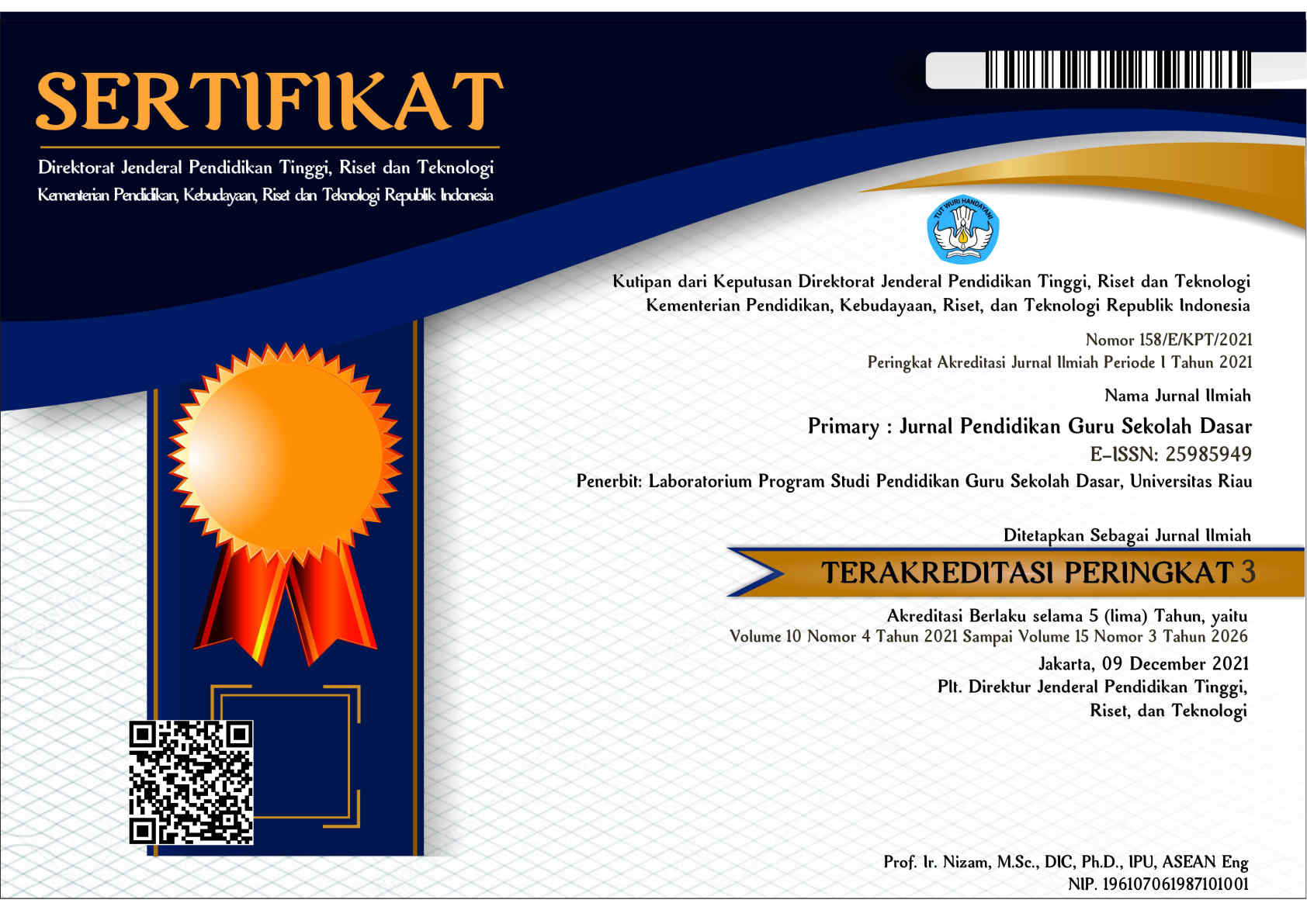PENGEMBANGAN LEMBAR KERJA SISWA BERBASIS PREDICT-OBSERVE- EXPLAIN PADA PELAJARAN ILMU PENGETAHUAN ALAM KELAS IV
Abstract
This study aims to produce teaching materials in the form of Predict-Observe-Explain-based student worksheets in class IV science lessons the theme of Always Saving Energy is valid, practical, and effective in improving understanding of concepts. The research approach uses mixed methods with the Research and Development (R and D) methodology with procedures consisting of 4 steps namely 1) define, 2) design, 3) develope, 4) disseminate. Furthermore, the data collection instruments used questionnaire sheets for product validation by experts, teacher response questionnaire sheets, and items about understanding the concept of science. Data collected sequentially were analyzed using the Content Validity Index (CVI), Descriptive Statistics, and Independent Sample t Test. The results obtained are Predict-Observe-Explain student worksheets: 1) content valid criteria with a CVI value of 0.9, 2) good practicality criteria with a percentage of 79.56%, and 3) effective criteria in increasing understanding of the concept of Natural Sciences with evidence of a significant difference between an increase in the average understanding of the concept of experimental class science by 21.3750 higher than the increase in understanding of the concept of science in the control class of only 16.2500.
Keywords
Full Text:
PDF (Bahasa Indonesia)References
Abdillah, C., Linuwih, S., & Isnaeni, W. (2017). The effectiveness of model learning Preser-X assisted LKS against science process skills and understanding students concept. Journal of Primary Education, 6 (3), 192-199. DOI:10.15294/jpe.v6i3.15531
Abdillah, C., Anggara, D. S., & Permana, P. S. (2019). Perencanaan Pengajaran. Diakses dari http://eprints.unpam.ac.id/8566/
Surya Anggara, D., & Anwar, S. (2017). Statistika Pendidikan. Diakses dari http://eprints.unpam.ac.id/1809/
Anggara, D.S., Abdillah, C. (2019). Metode Penelitian. Tangerang Selatan: UNPAM PRESS.
Anggara, DS., Abdillah, C., & Indrawan, HI. (2019). “Developing Predict-Observe-Explain worksheets on elementary school mathematics subject.” Proceedings:Empowering Science and Mathematics for Global Competitiveess.
Anggara, D. S., & Abdillah, C. (2020). Pengaruh Model Pembelajaran Predict-Observe-Explain dan Minat Belajar Siswa Terhadap Prestasi Belajar Matematika Siswa Kelas IV di SDN Wilayah Kelurahan Nalumsari, Jepara. PEKOBIS: Jurnal Pendidikan, EKonomi, dan Bisnis, 4(2), 9-20. DOI: http://dx.doi.org/10.32493/pekobis.v4i2.P9-20.3945
Borg, W. R., & Gall, M. D. (1984). Educational research: An introduction. DOI: 10.2307/3121583
Hilario, Jose. (2015). The Use of Predict-Observe-Explain-Explore (POEE) as a New Teaching Strategy in General Chemistry –Laboratory. International Journal of Education and Research, 3(2): 37-48. Diakses dari https://www.ijern.com/journal/2015/February-2015/04.pdf
Kala, Nesli. (2013). The Effectiveness Of Predict–Observe–Explain Technique In Probing Students’ Understanding About Acid–Base Chemistry: A Case For The Concepts Of Ph, Poh, And Strength. International Journal of Science and Mathematics Education, 11(3): 555-574. DOI: https://doi.org/10.1007/s10763-012-9354-z
Kearney, M. (2004). Classroom use of multimedia-supported predict–observe–explain tasks in a social constructivist learning environment. Research in science education, 34(4), 427-453. DOI: https://doi.org/10.1007/s11165-004-8795-y
Kisiel, J. F. (2003). Teachers, museums and worksheets: A closer look at a learning experience. Journal of Science Teacher Education, 14(1), 3-21. DOI: https://doi.org/10.1023/A:1022991222494
Liew, C. W., & Treagust, D. F. (1995). A predict-observe-explain teaching sequence for learning about students’ understanding of heat and expansion of liquids. Australian Science Teachers’ Journal, 41(1), 68-71. Diakses dari: https://eric.ed.gov/?id=EJ509083
Lynn, M. R. (1986). Determination and quantification of content validity. Nursing research. DOI: https://doi.org/10.1097/00006199-198611000-00017
Newton Trevor Stoffels (2005) “There is a worksheet to be followed”: A case study of a science teacher's use of learning support texts for practical work, African Journal of Research in Mathematics, Science and Technology Education, 9:2, 147-157. DOI: https://doi.org/10.1080/10288457.2005.10740585
Peraturan Menteri Pendidikan Nasional Nomor 37 Tahun 2018 Tentang Perubahan Atas Peraturan Menteri Pendidikan dan Kebudayaan Nomor 24 Tahun 2016 Tentang Kompetensi Inti dan Kompetensi Dasar Pelajaran Pada Kurikulum 2013 Pada Pendidikan Dasar dan Pendidikan Menengah. 2018. Jakarta
Polit, D. F., & Beck, C. T. (2006). The content validity index: are you sure you know what's being reported? Critique and recommendations. Research in nursing & health, 29(5), 489-497. DOI: https://doi.org/10.1002/nur.20147
Prastowo, A. (2012). Panduan Kreatif Membuat Bahan Ajar Inovatif. Jogjakarta: Diva Press
Rao, R. V., Savsani, V. J., & Vakharia, D. P. (2012). Teaching–learning-based optimization: an optimization method for continuous non-linear large scale problems. Information sciences, 183(1), 1-15. DOI:https://doi.org/10.1016/j.ins.2011.08.006
Rempusheski, V.F., dan O’Hara, C.T (2005) “Psychometric properties of the Grandparent Perceptions of Family Scale”. Nursing Research, 54, 419– 427. DOI: https://doi.org/10.1002/nur.20147
Santrock, W. John. 2010. Psikologi Pendidikan.
Sujana, A. (2013). Pendidikan IPA. Bandung: Rizqi Press
Thiagarajan, S. (1974). Instructional development for training teachers of exceptional children: A sourcebook. Diakses dari: https://eric.ed.gov/?id=ED090725
Trianto. (2012). Model Pembelajaran Terpadu: Konsep, Strategi, dan Implementasinya dalam Kurikulum Tingkat Satuan Pendidikan (KTSP). Jakarta: Bumi Aksara
Woolfolk Hoy, A., & Murphy, P. K. (2001). Teaching educational psychology to the implicit mind. Diakses dari: https://psycnet.apa.org/record/2001-16478-007
DOI: http://dx.doi.org/10.33578/jpfkip.v9i4.7967
Refbacks
- There are currently no refbacks.
Copyright (c) 2020 Dameis Surya Anggara, Candra Abdillah

This work is licensed under a Creative Commons Attribution-NonCommercial-ShareAlike 4.0 International License.
____________________________________________________________
Primary: Jurnal Pendidikan Guru Sekolah Dasar
Secretariat
Program Studi Pendidikan Guru Sekolah Dasar
Gedung B1, FKIP Universitas Riau
Kampus Bina Widya Km. 12,5 Simpang Baru Panam
Pekanbaru Riau Indonesia 28293
e-mail : primary@ejournal.unri.ac.id



